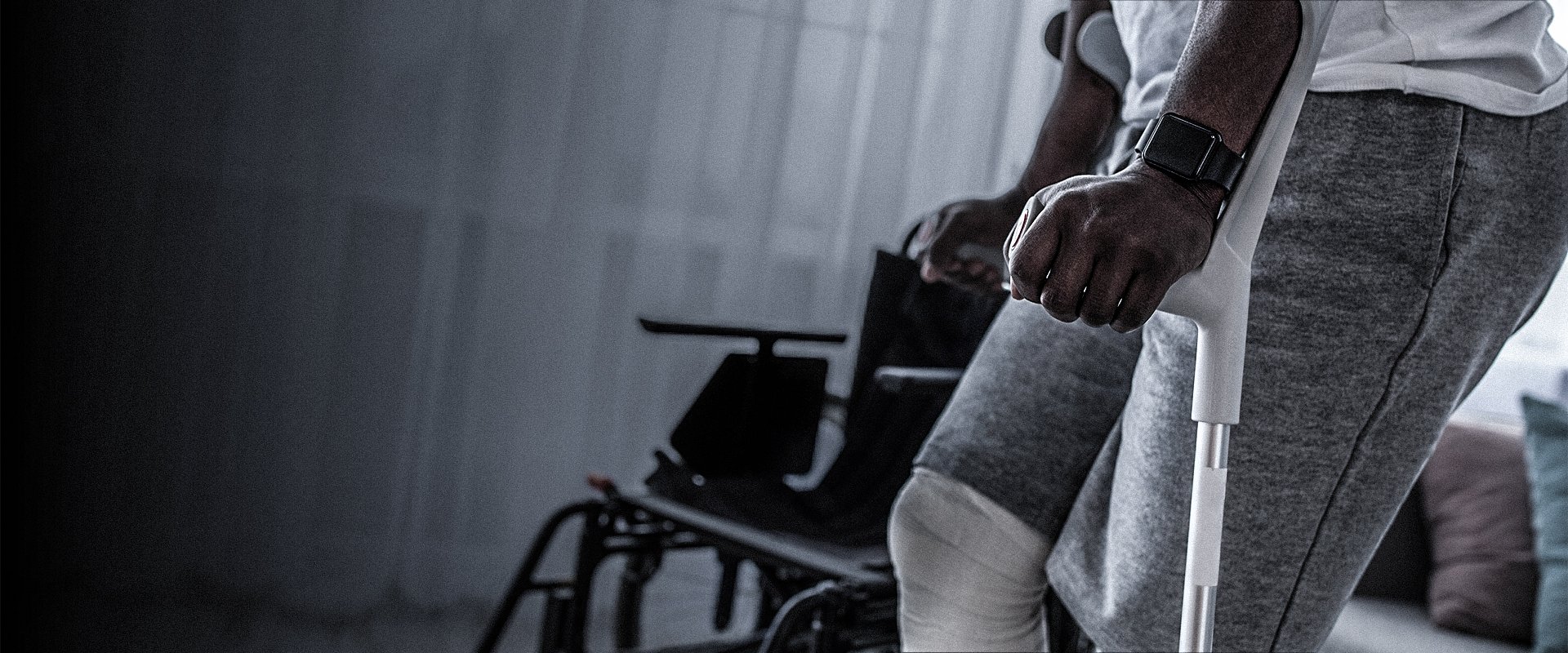
Rehab for Post Fracture Fixation
AT EVOLVE
Rehab for Post Fracture Fixation
HOW CAN PHYSICAL THERAPY HELP ME RECOVER FOLLOWING FRACTURE-FIXATION SURGERY?
While most bone breaks heal on their own following a period of immobilization in a cast or brace, in some cases surgery is required to stabilize or “fixate” the fractured bone so that it can heal properly. Fracture fixation surgery may be performed on any bone in the body if deemed necessary by an orthopedic surgeon. Following this type of surgery, physical therapy is often recommended to promote healing of the surgical area and facilitate return to full function through the use of manual therapy techniques, therapeutic exercises, neuromuscular re-education and more.
WHAT DOES PHYSICAL THERAPY FOLLOWING FRACTURE-FIXATION SURGERY LOOK LIKE?
My team of physical therapists and I will help you recover from fracture fixation surgery. In many cases surgeons provide a postsurgical protocol that will help guide your therapist on how much weight bearing, strength, range of motion and activity the injured area can tolerate at any given time following the surgery. These protocols are in place to ensure the surgical site is stable enough to withstand the stress that movement and exercise will place on the area. In the beginning your PT will work on reducing swelling around the surgical site, teach you how to use an assistive device to modify your weight bearing if needed and initiate return of muscle function around the surgical area. Attention will also be placed on adjacent areas to prevent atrophy or deconditioning from setting in elsewhere. As recovery progresses you will continue through a series of exercises to increase range of motion in the area, improve strength and neuromuscular control, regain normal movement patterns and then progress to sport-specific or work-specific training exercises. In the case of fractures to the arm or hand, you may see a specialized physical therapist called a “hand therapist,” who has extra training in rehabilitation of the upper extremity.
HOW LONG WILL I NEED POST FIXATION REHAB PHYSICAL THERAPY?
The duration of your physical therapy plan of care will vary depending on the type of fixation surgery you had, any additional impairments that also need to be addressed and the postoperative protocol set by your surgeon. While complete resolution of symptoms and return to full function can take some time, you may begin to see some results right away. You should experience improvements in many symptoms such as pain, stiffness, and inflammation within a couple of weeks. Progression in strength, flexibility and overall mobility that allows you to use the injured area in its normal capacity will take longer. Achieving long lasting results may take some time, but dedication to your program will help you achieve these results. Your PT will be able to give you a more specific timeline for recovery after your surgery and as you move through the rehabilitation process.
FRACTURE TREATMENT
A bone break, also known as a fracture, can occur in any bone when stress across that bone exceeds its tolerance. There are several different types of bone fractures:- Transverse fracture, oblique fracture, linear fracture and spiral fracture are all named based on the direction of the fracture line
- Comminuted fracture describes a bone broken into several pieces
- Avulsion fracture occurs when a small piece of bone breaks away
- Pathologic fractures are caused by a disease that weakens the bone
- Stress fractures begin as a weakening of the bone from overuse and can develop into a full break
- Compression or wedge fracture usually occur in the vertebrae of the spine
End Injury Progression
Rehab physical therapy for post fracture fixation has proven to prevent injury, slow and even stop pain issues, improve performance, and reverse injury progression in many cases.
Relieve Pain
The movements used in this technique can target your entire body helping you to manage discomfort and pain during the course of your physical therapy treatments.
Improve Range of Motion
Posture awareness is an important area to focus on due to the fact that certain positions may cause you further discomfort and pain.
Restore Mobility
You can regain mobility and flexibility by taking part in the stretches and exercises as prescribed by your physical therapist.
How Long Will Rehab Physical Therapy for Post Fracture Fixation Treatments Last?
If you decide to work with a physical therapist to help with post fixation rehab related issues, your entire treatment plan could consist of around 8-20+ different physical therapy sessions that will each last 60-90 minutes. Once you complete your customized physical therapy treatment plan, you will be able to continue to do the prescribed stretches and exercises utilized during your PT sessions yet in the comfort of your own home.
WHAT CAN I EXPECT FROM PHYSICAL THERAPY AFTER SURGERY?
During your first visit with a physical therapist following fracture fixation surgery, your therapist will interview you about your surgery, discuss any post surgical restrictions or protocols in place and ask you about the long term goals you have for returning to activities. They will also perform a physical exam to evaluate the surgical site as well as nearby areas that may be affected either by the surgery or by the injury that led to the fracture. All of this information will allow them to create an individualized rehabilitation plan of care.
The exact progression of your recovery will depend on the type of surgery you had, the location and how quickly you are allowed to bear weight through the area, move and mobilize the area and perform exercises. Some surgeries will require a period of immobilization or limited weight bearing to allow tissues to heal sufficiently before any stress is applied to them, while other surgeries will benefit from a more active recovery approach right away. Right after your surgery your physical therapist may use modalities, manual therapy techniques or gentle passive range of motion (when allowed) to address pain and inflammation and to preserve motion. As you progress through your recovery and the surgical site is allowed to undergo more stress, your program will likely include some of the following types of treatment in order to achieve your maximal level of function. Don’t be surprised if you find yourself working out areas adjacent to the surgical site or even performing some aerobic training as all of this is important to restore full function following a surgery.
Strengthening: Restoring strength and endurance to the muscles around the surgical site and adjacent areas is an important part of post-surgical rehabilitation. Both the surgery itself and any immobilization that is needed for fracture healing can cause muscle weakness and atrophy.
Stretching: Stretching is often needed after a surgery to restore normal joint motion and muscle length but needs to be done carefully to prevent disruption of the healing process.
Neuromuscular Re-education: This type of treatment is used to improve the motor control and coordination of muscles around the area that was fractured so that it functions well during both everyday activities and higher level activities like sport and recreation.
Gait training: This type of treatment involves learning how to walk normally again following the surgery. This is often needed following a fracture to the leg or foot.
Balance: Balance is often affected by leg injuries and surgeries and you will likely be practicing balance exercises under a number of conditions if you fractured your foot, ankle or leg.
Power and Agility: In the late stages of post-surgical rehab it is important to address power and agility so that you can jump, run, cut, throw and lift. The type of power or agility exercises you do will vary based on what part of the body was injured.
Sport- and work-specific Tasks: For athletes returning to sport, sport-specific exercises will be incorporated later on in your rehabilitation to prepare the injured area for the demands of returning to play. Work-specific tasks like climbing a ladder, lifting, pushing and pulling will also be addressed in the later phase of rehab.
CALL TO SCHEDULE AN APPOINTMENT TODAY
Breaking any bone is a temporary disruption to your usual activities but having surgery to stabilize the bone requires extra care to ensure a full recovery. The team of physical therapists at Evolve are here to help you achieve that full recovery. Call Evolve today to get started on your recovery from fracture fixation surgery.
Mill Basin (located in Harbor Fitness)
6161 Strickland Ave
Brooklyn, NY 11234
Monday: 7am-8pm
Tuesday: 7am-8pm
Wednesday: 8am-5pm
Thursday: 7am-8pm
Friday: 8am-1pm
Park Slope (located in Harbor Fitness)
550 5th Ave.
Brooklyn, NY 11215
Monday: 9am-8pm
Tuesday: 8am-6pm
Wednesday: 9am-8pm
Thursday: 8am-6pm
Friday: 8am-3pm
Gravesend
372 Avenue U
Brooklyn, NY 11223
Monday-Thursday: 8am-8pm
Friday: 8am-3pm
Ready to take the next step to a healthier you?
Contact Us Today!
REHAB PHYSICAL THERAPY FOR POST FRACTURE FIXATION!
Need Rehab for Post Fracture Fixation?
Let our caring and compassionate physical therapists help you with relieving pain while getting you back on your feet comfortably.
Call now to schedule your first PT consultation free of charge.
Call: 1-718-569-7926







